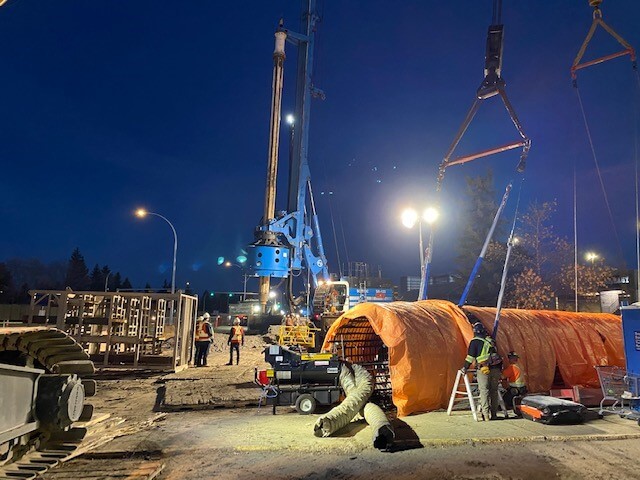
Shorter days and colder temperatures during winter months increase the need for light plants and generators.
Uses and locations for light plants
Light plants are portable units used to light roadways and work zones along the alignment. Construction in certain areas has made it necessary to temporarily remove light posts along some adjacent roadways. In their place, light plants have been set up to adequately light roadways for both pedestrians and motorists. Because these are temporarily replacing permanent light fixtures, we are required to keep them on throughout the night even if no work is being performed.
In contrast, lights used for our work zones will remain on as long as work is being performed. At the end of a shift, these will be powered down if no work is occurring in the work zone.
Types of light plants
The type of light plant most often used along the alignment is a solar-powered “whisper-quiet” model that gathers energy during the day via solar panels to power the lights each night. When it is cloudy or snowing, the amount of energy gathered may not be enough to power the light for the entire night. In these cases, the solar plants will pull energy from a backup diesel generator that will run for several minutes until the plant has charged enough to run off the battery.
Because of this, generators may run periodically during the night to ensure enough power for the light plant.
Noise associated with light plants
Backup generators for light plants may turn on periodically during the night to ensure the plant has enough power to last until morning. On average, generators for these light plants run at a volume of approximately 65 dB(A) decibels. Diesel-generated light plants run at a volume of approximately 69 dB(A). Please see the associated chart for more context on decibel levels.
Heating and hoarding
Freezing temperatures can make construction activities difficult. For this reason, certain areas of the construction site incorporate a method known as “heating and hoarding” to achieve an appropriate temperature during the winter months. Tarps or tents are set up to insulate these areas and warm air is cycled through via portable glycol heating units or diesel-powered generators.
Types of heaters
Heating units remain active until the specific construction activity in that area is complete. This means that many of these generators will be running throughout the night to control the temperature, even when no work is being performed. These units run at a volume of approximately 69 dB(A) decibels.
Overview
Marigold approaches the construction of Valley Line West with great care and regard for noise and vibration caused by construction activities. While noise and vibration are unavoidable in any construction project, Marigold is committed to minimizing noise and vibration impacts along the corridor during construction.
The City of Edmonton’s Community Standards Bylaw 14600 describes noise control. It identifies that hours of work for construction are Monday to Saturday, from 7 a.m. to 9 p.m., and on Sundays, from 9 a.m. to 7 p.m.
Under some circumstances, Marigold will apply for a permit to allow work outside of the regulations of the Noise Bylaw. The most common reason for this is to allow for overnight work to occur. Such necessary work can involve continuous or lengthy processes such as concrete pours and utility work — or work in roadway areas during low traffic conditions. We at Marigold incorporate noise mitigation in our work planning and construction activities where possible. For example, we try to schedule noisier work for daytime hours, limit the size of equipment where feasible, ensure regular equipment inspections and proper mufflers, adjust work methods, change back-up alerts to strobe lights instead of beeping where possible, and more. Marigold tailors noise mitigation to the location and the kind of construction activity.

Solar-powered light plants average around 65 dB(A)
Diesel-powered light plants average around 69 dB(A)
Ambient baseline noise in this area averages 63 dB(A)
Public Commitment:
Marigold is committed to minimizing noise and vibration impacts along the alignment during construction, especially in residential areas.
If you have any concerns, please call 780-412-2183 or email us at public@marigoldinfra.ca.